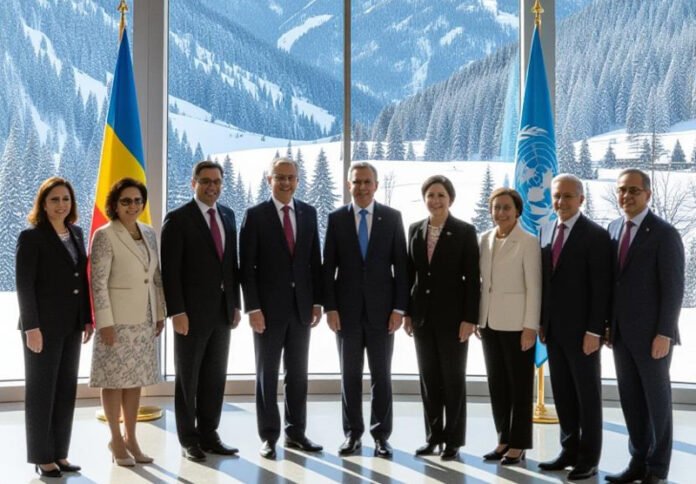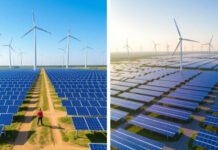Geneva, October 23, 2025:
In a decisive moment for global climate policy, more than 190 countries gathered under the UN umbrella today to unveil the “Net Zero 2050 + 10” Action Plan, an ambitious blueprint to combat record-breaking heat waves, floods, and forest fires seen this year across continents.
The summit, held in Geneva, comes amid mounting scientific warnings that the world is dangerously close to surpassing the 1.5 °C global warming threshold.
“The time for half-measures is over,” declared UN Secretary-General António Guterres. “This plan gives nations ten extra years of flexibility but zero excuses for inaction.”
🔹 What Is the ‘Net Zero 2050 + 10’ Plan?
The proposal effectively binds all major economies to achieve net-zero greenhouse gas emissions no later than 2060, with richer nations like the US and EU maintaining the 2050 deadline. The “+10” refers to transitional decades granted to developing economies—including India, Indonesia, and Brazil—to balance growth with sustainability.
Key features include:
A $2 trillion Green Transition Fund, jointly financed by G7 countries and sovereign wealth funds.
Global carbon market framework to be finalized by 2026.
Mandatory climate-risk disclosure for corporations by 2030.
Investment push for renewables, EV mobility and hydrogen infrastructure.
🔹 India Emerges as Key Negotiator
Representing India, Environment Minister Bhupender Yadav announced a $50 billion national plan to scale solar and green hydrogen capacity by 2030.
“India believes growth and green are not opposites but partners,” he said. “Through technology transfer and climate finance, we will power our future without compromising our planet.”
India’s commitment includes expanding rooftop solar in rural areas, boosting EV infrastructure in tier-2 cities, and launching a carbon credit exchange within the next year.
Environmental analysts praised India’s leadership role, calling it a “turning point in South-South climate cooperation.”
🔹 U.S. and EU Announce Green Finance Deals
U.S. President and European Commission Chief Ursula von der Leyen jointly announced a Global Green Investment Compact, pledging $400 billion in grants and low-interest loans for developing nations.
“The climate crisis is a global credit test. Let us prove our economies can earn trust by cutting carbon, not corners,” Harris remarked.
The EU’s contribution will focus on hydrogen and battery supply chains, while the U.S. plans to expand clean tech export credits through its EXIM Bank.
🔹 Scientific Community Welcomes But Warns
Climate scientists hailed the summit’s financial commitments as a positive step but cautioned that implementation is key.
Dr. Maria Santos of the World Climate Research Program stated: “Money alone won’t fix methane or deforestation. We need policy teeth and public accountability.”
She highlighted that global carbon emissions must fall by 45 percent by 2030 to stay on track for net-zero targets—an objective still far from guaranteed.
🔹 Disaster Backdrop Strengthens Resolve
This year’s wave of climate disasters added urgency to the talks. Severe heat in southern Europe, floods in Pakistan and Bangladesh, and wildfires in California and Australia caused combined losses exceeding $280 billion, according to UNEP data.
“The planet is screaming, and our policies must listen,” said climate activist Greta Thunberg, who addressed delegates outside the Palais des Nations.
🔹 Critics Call for Stronger Enforcement
Despite the applause, critics argue that many pledges are non-binding. Several NGOs warned that corporate lobbying and political backsliding could undermine progress.
The Coalition for Climate Justice issued a statement: “Without a global carbon price and penalties for non-compliance, the Net Zero 2050 + 10 plan risks becoming a paper promise.”
🔹 Markets and Industry React
Global stock markets responded favorably to news of long-term policy clarity. Renewable-energy indices in Europe and Asia jumped 4–6 percent, while oil futures eased slightly as investors priced in reduced long-term fossil demand.
Corporate leaders from Tesla, Adani Green, and Siemens Energy announced fresh joint ventures aligned with the summit targets.
“Predictable policy means predictable profit — and planetary benefit,” said Siemens Energy CEO Christian Bruch.
🔹 The Road to COP30
The Geneva summit sets the tone for COP30 in Brazil next year, where nations will finalize emission reduction benchmarks and climate finance disbursements. Experts believe the Net Zero 2050 + 10 plan will form the foundation of the COP30 agenda.
“If Geneva was the commitment, Rio will be the test,” remarked UNEP chief Inger Andersen.














